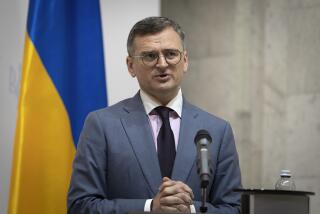Yeltsin Cedes Some Power Before His Bypass Surgery
- Share via
MOSCOW — As he prepares for open-heart surgery, Russian President Boris N. Yeltsin has handed over responsibility for security and national defense to Prime Minister Viktor S. Chernomyrdin but will keep his own finger on the “nuclear button,” his spokesman said Tuesday.
The voluntary transfer of power that took effect Monday was believed to be unprecedented for a major world leader, although it remained unclear just how much authority Chernomyrdin will have while Yeltsin undergoes the coronary bypass operation and recuperates.
Yeltsin retained the right to summon his Security Council into session, and he demanded a full accounting of the assets and expenses of ministries he was putting under Chernomyrdin’s temporary control.
The newly reorganized Security Council is headed by Alexander I. Lebed, the Kremlin’s increasingly popular security chief, who has made no secret of his desire to succeed Yeltsin as president and is engaged in an open power struggle with Chernomyrdin.
“For the period of his vacation, President Boris Yeltsin instructed the heads of the power ministries to agree on issues demanding the decision of the head of state with Prime Minister Viktor Chernomyrdin,” presidential spokesman Sergei V. Yastrzhembsky said.
He later specified that the order referred to the Cabinet members responsible for defense, law enforcement, border guards, counterintelligence, government communications, disaster response and federal security, all of whom usually report directly to the 65-year-old Yeltsin.
But Yastrzhembsky said the order signed by the president “does not concern the so-called nuclear button,” the briefcase with missile-launching coordinates that is always in the head of state’s possession.
State-run television noted that nuclear keys are also in the hands of Defense Minister Igor N. Rodionov and army Chief of Staff Mikhail P. Kolesnikov and that without their cooperation the “nuclear football” is useless.
Despite the apparent limits on Chernomyrdin’s expanded powers, the hand-over was believed to be the first in modern times for the leader of one of the world’s superpowers. Even after the March 30, 1981, assassination attempt against President Reagan, only ceremonial duties were passed to Vice President George Bush while Reagan recovered.
Yeltsin announced Thursday that he will undergo surgery in late September to correct his myocardial ischemia, a restriction of blood flow to the heart that caused him to suffer two heart attacks last year and kept him out of the Kremlin for more than three months. No specific date, place or medical team has been named for the operation, which is expected to last four to six hours and to stop the functioning of his heart.
The Russian Constitution is vague about conditions for designating a stand-in ruler for temporary periods of incapacitation; leading political figures here have been contradictory in their advice and predictions.
Gennady N. Seleznyov, the Communist speaker of parliament’s lower house, insisted again Tuesday that Yeltsin relinquish presidential powers for the duration of his convalescence.
“The constitution must be observed and authority must be officially passed over to the prime minister,” Seleznyov told the Interfax news agency.
But Anatoly B. Chubais, Yeltsin’s chief of staff, told the agency that there was no justification for shifting power away from Yeltsin and that if the need arose, it would probably be for no longer than “a matter of hours or a couple of days.”
Chernomyrdin told the quasi-official Itar-Tass news agency that he considered the clamor over Yeltsin’s capacity to rule “artificial and tactless.”
More to Read
Sign up for Essential California
The most important California stories and recommendations in your inbox every morning.
You may occasionally receive promotional content from the Los Angeles Times.














